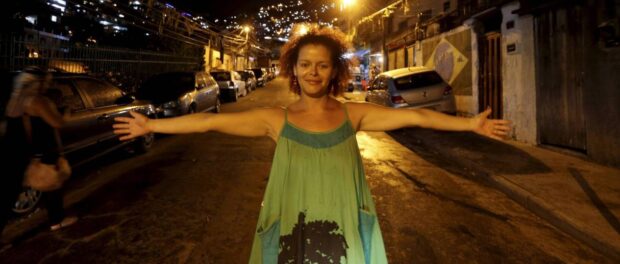
For the original in Portuguese, published in O Globo, click here.
A Rio native documents memories of the favela where she was born. For her, the occupation of Vidigal by the middle class and foreigners will create an exodus and destroy the identity of the favela.
Bárbara Nascimento: I am 36 years old and I was born in Vidigal, where I live. My mother is from Bahia, I have a three year-old son and I am married to a washing machine repairman. I studied Language and Literature at the Federal University of Rio (UFRJ), and now I teach Portuguese and literature in a state school here on the hill. I am also an activist in defense of the favela and its culture.
Q: Tell me something I don’t know.
BN: Vidigal is fully booked. I am going to place a billboard on the road saying that. There are traffic jams. Trucks going up and down the hill, hotels, there’s even a Belmonte [a bar chain]. Since when is Belmonte something for favelas? There are blackouts every other day. People think it’s drugs being carried up the hill, but these blackouts are something else: it’s a failure of the electrical power supply in a high density area.
Q: What is happening?
BN: That is what I am studying for my master’s degree. The relation of those who are here to those who come from outside. How they deal with the visitors, the middle class that buys their neighbor’s house, the foreigners, and those who attend the parties in the favelas where you can’t even find favela residents.
Q: Have you been to one of these parties?
BN: I have been once, and I don’t plan to go again. Besides me, there were only three other people from Vidigal: the ticket agent, the bouncer, and an actor. The actor and I don’t even really count. I earn a better salary and I have a university degree. But where are the people who live a tough life?
Q: Are you against coexistence?
BN: No way! I am against appropriation. I am against going for a walk with my son and being photographed. I’m not a monkey. And I’m against the rise of real estate prices. What about people who rent a house? A while ago, people showed interest in Rua Nova and Rua 3, which are not part of the favela. Now they want the places that are ours.
Q: “Ours”, whose?
BN: I argue that favelas are for favela residents. They have already prohibited the funk parties, putting an end to peoples’ recreation. This kind of thing frustrates people. A long time ago samba was associated with thuggery, which is why they wanted to prohibit it. It’s exactly the same with funk. Was it financed by the drug traffickers? Yes, it was. But why doesn’t the state finance it? Because it’s poor people’s music! That’s why I find real peaceful coexistence difficult to achieve.
Q: You always use the term favela instead of community.
BN: Every group can be perceived as a community, and it doesn’t have a personality. Favela means something. A kind of place, a history, it’s a nice word. It’s in the music. What is a community, really? Using the word community for a favela is like using the euphemism “brunette” instead of saying black.
Q: What kinds of memories are you collecting?
BN: One of the focuses is the movement in defense of favelas that originated in the 1970s; the war as narrated by us and not by a sociologist, or even worse, a TV presenter.
Q: Tell us one episode.
BN: There’s the one about a truck that came in to remove residents. Guess what truck it was?
Q: I have no idea.
BN: From Comlurb [garbage collection truck]. A dumpster to remove favela residents. People provided coffee and a barbecue for the drivers, who were in fact just as humble as us, until lawyer Bento Rubião got here to prevent the removal.
Q: How is the UPP (Pacifying Police Unit) going?
BN: Well, we no longer see armed thugs all over the place watching us. But they are still there on the top of the hill; they fire shots. Instead of one faction now we have two.
Q: What can the story of Vidigal teach Rio and Brazil?
BN: When a person knows his place he (or she) recognizes himself as an individual. Here, a population that is already marginalized runs the risk of losing its sense of belonging: our home is being denied us. (Documenting) memory can teach us that there is a history, an identity, and that we need to stay and fight against gentrification. And that this might inspire other people.
